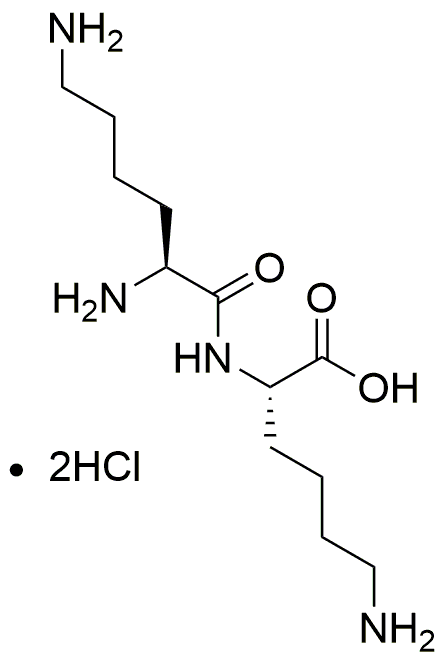Lys-Lys-OH·2HCl is widely utilized in research focused on:
- Peptide Synthesis: This compound serves as a building block in the synthesis of peptides, particularly in the development of therapeutic proteins and vaccines, enhancing the efficiency of drug formulation.
- Biotechnology: In the biotechnology sector, it is used to modify proteins, improving their stability and activity, which is crucial for developing biopharmaceuticals.
- Research in Neuroscience: It plays a role in studying neuropeptides, aiding researchers in understanding neurological functions and potential treatments for neurodegenerative diseases.
- Cosmetic Formulations: The compound is incorporated into skincare products for its moisturizing properties, contributing to improved skin hydration and texture.
- Food Industry: It is used as a food additive, enhancing flavor and nutritional value, which is beneficial for developing health-oriented food products.
General Information
Properties
Safety and Regulations
Applications
Lys-Lys-OH·2HCl is widely utilized in research focused on:
- Peptide Synthesis: This compound serves as a building block in the synthesis of peptides, particularly in the development of therapeutic proteins and vaccines, enhancing the efficiency of drug formulation.
- Biotechnology: In the biotechnology sector, it is used to modify proteins, improving their stability and activity, which is crucial for developing biopharmaceuticals.
- Research in Neuroscience: It plays a role in studying neuropeptides, aiding researchers in understanding neurological functions and potential treatments for neurodegenerative diseases.
- Cosmetic Formulations: The compound is incorporated into skincare products for its moisturizing properties, contributing to improved skin hydration and texture.
- Food Industry: It is used as a food additive, enhancing flavor and nutritional value, which is beneficial for developing health-oriented food products.
Documents
Safety Data Sheets (SDS)
The SDS provides comprehensive safety information on handling, storage, and disposal of the product.
Product Specification (PS)
The PS provides a comprehensive breakdown of the product’s properties, including chemical composition, physical state, purity, and storage requirements. It also details acceptable quality ranges and the product's intended applications.
Certificates of Analysis (COA)
Search for Certificates of Analysis (COA) by entering the products Lot Number. Lot and Batch Numbers can be found on a product’s label following the words ‘Lot’ or ‘Batch’.
Numéro de catalogue
Numéro de lot/série
Certificates Of Origin (COO)
This COO confirms the country where the product was manufactured, and also details the materials and components used in it and whether it is derived from natural, synthetic, or other specific sources. This certificate may be required for customs, trade, and regulatory compliance.
Numéro de catalogue
Numéro de lot/série
Safety Data Sheets (SDS)
The SDS provides comprehensive safety information on handling, storage, and disposal of the product.
DownloadProduct Specification (PS)
The PS provides a comprehensive breakdown of the product’s properties, including chemical composition, physical state, purity, and storage requirements. It also details acceptable quality ranges and the product's intended applications.
DownloadCertificates of Analysis (COA)
Search for Certificates of Analysis (COA) by entering the products Lot Number. Lot and Batch Numbers can be found on a product’s label following the words ‘Lot’ or ‘Batch’.
Numéro de catalogue
Numéro de lot/série
Certificates Of Origin (COO)
This COO confirms the country where the product was manufactured, and also details the materials and components used in it and whether it is derived from natural, synthetic, or other specific sources. This certificate may be required for customs, trade, and regulatory compliance.


